I’ve been following Vinnie Moore's career since the mid-80s when he blew everybody’s mind with his first record, Mind’s Eye. Although his style has morphed from neo-classical to instrumental rock, he’s always played with enviable articulation and feel.
On top of that, Vinnie gets to fly all over the world playing “Rock Bottom,” “Lights Out,” and “Doctor Doctor” with Phil Moog, Andy Parker and Paul Raymond. As an added bonus, he gets paid to do this. UFO is on their third studio record with Moore, and it seems that hardcore fans accepting him as a replacement for the legendary Michael Schenker is no longer an issue.
Somehow, he managed to balance his work with UFO with his ever-evolving solo career. His new record, To The Core, is a blazing-yet-soulful notefest that explores his many influences ranging from funk and R&B to rock and techno. Moore loosens up and gives us a taste of the blusier aspects of his playing without sacrificing the fiery note selection his fans come to expect. It’s a fine record and I have yet to take it out of rotation on my car CD player. I caught up with Moore just before taking off for a tour with UFO.
I remember working through your instructional videos back in the '80s. They really helped me become a better guitarist.
Thank you. I’m trying to get those re-released on DVD. I just established contact with the company that bought Hot Licks. They’re slowly doing DVDs for all their older stuff but they haven’t gotten around to it. Hopefully they’re going to step it up quickly. I’ve been pretty busy so I think it’s a good time to get it out there again on DVD.
Are you considering doing any more instructional videos?
I’ve kicked it around and I’ve had a lot of people ask me to do it, but I’m not exactly sure yet.
Is it that you don’t have anyone you’d like to work with, or are you undecided about what you’d like to teach?
A little of both, plus I’ve been so busy with touring. I haven’t had a lot of time and I don’t know what I’d cover anymore. I don’t know any more licks. (Laughing)
You covered a lot of ground. Besides the awesome licks, I thought the section on modes was extremely helpful. It made me “get it.” You wouldn’t believe the teachers I’ve heard who take a simple concept and over complicate it.
It’s weird. I’ve heard so many people say that. It was so unclear to them and then they see that video and it really helped. That’s so good for me to hear. I just tried to make it idiot-proof and simplify it so anyone could understand.
What have you been up to lately?
I’ve had a little time off but it’s about to get real busy. UFO is going on the road at the end of May and we’re doing a lot of shows. We start in Germany and then we have England, Ireland, Scotland, Sweden and Belgium. All festivals and club dates.
What’s it like playing in UFO?
It’s been a blast for the most part. We have our third studio record coming out on June 2 and we did a live DVD. It’s a lot of fun playing with a rock band. I’m so used to doing my solo instrumental stuff, it’s a nice contrast. I’ve done so many gigs. It's just really good exposure to be playing out there in front of people.
It sounds like you’ve got the best of both worlds. Not only are you playing the classics, but you also get to create new material with an established band.
It’s fun to play these old tunes that I grew up listening to and it’s fun to write the new stuff with the band.
How do you write for UFO?
I write a lot of stuff, record it and send it to Phil Moog. He sifts through it and chooses the songs that are best for him vocally and the ones that he likes the best. Then we meet. Our home base is in Hanover, Germany because our manager lives there. All of our gear is in Europe. We get a rehearsal studio and just go through the stuff. We tighten it up and choose which songs we’re actually going to record, then go to a studio and lay it down.
When you send Phil the songs, are they full-blown songs with lyrics, chords and melodies or are they just riffs?
I never usually write lyrics but what I usually do is I give him two versions. I’ll send him just the music and then on the second CD I’ll send the songs with just me scatting out some vocals. I’m just singing notes or making up lyrics on the spot. This is just so he knows which part needs to be what. What’s the verse, what’s the chorus, that type of thing. He gets the basic structure. I sing lyrics and make them up on the spot to give him ideas, but I don’t know that he always listens to them. He likes to be inspired by the music. My vocal and melody ideas are just a last resort for him.
He probably switches around sections of the song as well.
Sometimes. He’ll sing a chorus over what I intended to be the pre-chorus. It’s just typical stuff when you work with a singer. They’re going to have their own ideas and hear things in their own way. Sometimes songs stay just as I’ve written them and sometimes he sings differently than I initially intended.
Do you submit material that you think will work for the classic UFO sound or do you submit whatever you have?
I present him with ideas that I think are musically right for UFO. With my solo stuff there’s a lot more open territory that I can move into. I can experiment and explore a little more with different genres of music. With UFO you can’t be throwing in jazz and this and that. It’s a straight-ahead rock band so I send him those kinds of ideas.
Your new record To The Core rocks heavily. I have your other releases, but this new one is more of a rock record than anything you’ve done before. It’s funky, too... a bit of a Santana vibe on some songs.
I’ve always been hugely influenced by Santana. I’ve been working on this record for a while now. I’ve been so busy touring that I haven’t been able to designate a whole clump of time to do it. I dove in between things and it’s taken a long time to get it finished. I’m happy it’s finally out there.
I’ve always wanted to do solo records. I need that creative outlet. When I started writing for it, my only plan was to be adventurous, let the music flow and go in any direction I wanted. When I did the record, I had no record label--I did it all myself. I presented the label with a finished copy. I think this is important because it made me feel like I was totally free to do anything I wanted musically. I’m into a lot of different styles of music and I wanted all that to come out. I think this is probably the most versatile record I’ve done and shows more of what I do as an artist.
 I agree. Some of it reminds me of a solo you once played on a backing track for a lesson in Guitar Techniques magazine. It was the rocking side to your guitar personality and a lot different than the neo-classical style you’re known for.
I agree. Some of it reminds me of a solo you once played on a backing track for a lesson in Guitar Techniques magazine. It was the rocking side to your guitar personality and a lot different than the neo-classical style you’re known for.
I do hear about that occasionally. They wrote a backing track for me and I went in and just wailed over it. I remember the guy who was recording it saying, “Man, I think people are going to be surprised when they hear this. You’re playing be-bop and all this different stuff that I didn’t know you played.”
That’s what I hear on the new record. You’ve got rock, funk, blues licks and be-bop lines all over the record. All theses styles have been hiding and it’s great to finally hear them bust out. [Laughing]
I’ve always been a rock guy. That’s basically what I am, a rock artist. But I’m into lot’s of different styles of music, and I like to throw it all in and let it flow.
How did you track everything?
I did all my guitars at my home studio. Most of my stuff was done before the drums were down. I recorded it to loops or to drums that I programmed. The drummer had a totally finished track to play to. There were a few where he recorded to my demo and then I went back and re-did all the guitars. Most of the stuff was done backwards where the drummer played after me. In some cases I even left some of the loops in the song. On the song “Transcendence” there’s all this exotic percussion. That stuff was left in the track.
I’ve always had trouble tracking with the drummer coming in last.
You gotta have the right guy.
You got Van Romaine!
He’s amazing and did an awesome job. He locked in completely. A lot of guys can’t do that. Even if they’re great drummers, they can’t lock into a track that’s already finished. It’s hard. It always amazes me because the drummer is the timekeeper. A guitarist or bass player can overdub to drums easily because that’s what we’re used to doing, but drummers aren’t use to doing that. They’re used to being the timekeeper and having other people play to their groove. It can be tricky for a lot of guys but Van just killed it.
Are you happy with the new UFO record?
Yeah. I think it came out really great. This is the first time I've had two records coming out within a week of one another.
How has playing with UFO influenced your guitar playing on To The Core?
I’d say that all the live playing I’ve done has helped me become a better musician and player. You just get better when you play in front of people. You have to go with the flow no matter what they throw at you.
Before I forget, I flipped out when I heard your solos on Jordan Rudess’ Rhythm of Time record. I didn’t even know that was you until I checked the album notes!
Thanks. I played two solos on that for him. I remember I didn’t have a whole lot of time and my manager who manages Dream Theater asked me if I would do it. I was like, “I would love to do it but I don’t have a whole lot of time. I hope he doesn’t send me some complicated piece of music that’s like in 13/8 timing or something.” He was like, “Everybody’s saying that.” [Laughing] That guy is pretty damn serious.
I really dig hearing you in different musical contexts. I recommend you do more of that.
It’s cool because you get to play on a track that you never would have written for yourself, so you end up playing differently than you normally would.
It’s good for your fan base too. I’m sure there were a ton of Dream Theater fans thinking, “Who the hell is this guy?!” Next they’ll be tracking down your catalogue.
People find it funny that Jordan actually played on my second record. That was way back.
Some of your old fans would like to know if the Vicious Rumors demos will ever be released to the public.
I don’t know. I’m not in contact with those guys. I played on four or five tunes.
Supposedly there’s material out there that contains the holy grail of early Vinnie Moore.
I don’t have it. [Laughs] I don’t even know about this. We did one gig in somebody’s backyard, like an outdoor party. I think there’s a tape of that somewhere lingering around. The guy who probably knows is the bassist Dave Starr. That was a lot of fun and way long ago. [Laughing]
You’re playing a new guitar. What is it?
I’m using a signature model made for me called the Dean Vinman 2000. I’ve been working with those guys for about two years and we immediately started talking about a signature model. They put something together for me to play based on our phone conversations and they kinda nailed it. It was probably 95% of what I wanted on the first try. From that point we started honing in on things and making some cosmetic changes and moving different things around. We spent a year refining all these small little details and now the guitar I’m playing is right off the shelf. It’s just like what someone would buy in a music store. It’s great. I’m going out to do a clinic this Saturday and I’m not even going to bring a guitar. I’m just going to play one of my signature models off the rack. It’s awesome to be able to do that.
What are some of the particulars that you had Dean work on that are different from other models?
I think the big thing is the shape of the neck. That’s really important to me. How comfortable the neck is for the left hand. Also the cutaway on the body where your arm rests, that’s another thing that I’m really picky about. One of the things is how high the strings are off the body. I don’t like guitars where the strings are really high off the body like a Les Paul. It feels awkward to my right hand. The Floyd Rose had to be recessed into the body and be a certain height off the body to accommodate my crappy technique.
Yeah right. [Laughing] Is it a C neck or a U neck?
Maybe somewhere in between. It’s kind of hard to describe. It’s not real round as in a C neck. I don’t like big and chunky, but not so thin. I think if it’s too thin you lose tone... it’s gotta have some meat to it. The body is alder and it has a piece of laminate maple top for cosmetic reasons, just to give it that cool wood grain look. It’s only an 8th inch thick so it’s not enough to really affect the sound properties of the guitar. It comes in trans finishes so you can see the wood grain. It’s really cool-looking.
You’re also endorsing a pickup.
Dean started their own pickup line called DMT. I helped them design a bridge pickup and I’ve been using that. They made me a signature pickup (The Dean Vinnie Moore Shredhead Pickup). I’m still using DiMarzios in the middle and the neck positions but the bridge pickup is the signature model.
What’s special about it?
It has less power than the ones I was using in the past. This one is about 12 or 13k. It’s not quite as weak as an old PAF, but it’s about halfway back to a PAF compared to what I was using. It’s not low power or high power, it's mid power. It’s more transparent than some of the more high power stuff. You hear more of the pick attack and the dynamics and it sounds more natural to me. You get more tone, whereas when you have high power pickups I found that it’s not as transparent.
In the neck I’m using a DiMarzio Fast Track 1 and in the middle it’s a DiMarzio Virtual Vintage Blues. I have another guitar where I switch those two pickups just to get some different tones.
The new record has some great tones. You’ve gotten away from a lot of the higher gain sounds and gone for more organic tones.
Too much gain takes away from the natural dynamics and the personality of the guitar. It makes things muddy too. Even live I’ve never really used a lot of gain compared to most people. When it gets too gainy and too fuzzy it masks all the clarity of the guitar. You lose a lot of the natural resonance. I always find that I back off on the gain on the amp. A lot of times live and in the studio, I’m constantly moving the guitar volume up and down. Sometimes I’ll move it up to ten, sometimes I’ll kick it back to seven or eight. Sometimes it’s on four. I get a lot of tones just by manipulating the guitar volume control. Turn it back to four and you get a nice, clean, half-crunchy kind of sound.
Are your amps set up to get a lead tone and then you back it off with the guitar volume?
Yeah. I set the amp for one tone on the amp all night and just leave it there. That’s what works for me. It’ll have enough gain to where if I’m playing lead and the guitar volume is on ten I get sustain but no muddiness. Then I’ll just back off when I want to clean things up. No channel switching, just one sound.
What amp are you using?
I’ve been using an Engl Special Edition head which is amazing because it has four thousand bells and whistles, none of which I use. [Laughing] I set it up for one tone and that’s it. In the studio I use a Marshall JCM2000. I have a lot of heads lying around that I use, but for some reason that Marshall JCM2000 seems to work when you throw a mic in front of it. I use the Lead 1 setting which is less gain and I’ll keep the preamp anywhere from five to eight.
What kinds of effects?
My pedalboard is always changing. I don’t even know what it’s going to be for the June tour. Normally I’m pretty simplistic with my effects. There’s a wah-wah and a delay just to give me some ambiance and that’s pretty much the heart of my sound. I’m using a Dunlop Crybaby. At one point I felt like I was getting too dependent on the wah. I was just stepping on it more out of habit because it was there, so I almost left it home. Then I made a conscious effort to have it there but not use it unless I absolutely needed it. You can easily get lost in it and overdo the wah thing.
Yeah, but you’re covering Schenker.
Yeah that’s the thing. He always had the half-cocked wah-wah pedal sound, and so sometimes I’ll kick it on for that.
Were you pressured at all to get close to his note selection and style for those songs?
Not really. When we first started rehearsing, Phil was real adamant about me doing my own thing. I was going to copy some of the Schenker stuff and he said, “No, do your own thing!” That was really cool for me to hear that they wanted a guy who had his own personality and wasn’t just a copycat. My approach is that there are certain things in the old songs where you have to play the part on the record because it’s an important part of the song. On the sections where he improvises, I just kind of go off and improvise.
I like that you’re respectful to those classic tunes, yet you bring your own thing to the table.
I’m always trying to do what’s right for the song. I don’t try to shred classical arpeggios over a rock 'n' roll song. [Laughing] It’s not tasteful and it doesn’t work. I go for the vibe of the song and let that be the guiding light.
Which delays are you using?
I’ve always liked the Boss DD-3. They’re inexpensive, they have a great sound and they just work. I started using some T-Rex pedals and the MXR Carbon Copy which has that warm analog sound. I would guess that I’ll take those three delays out on the
road and have three different delays set up. I like being able to tweak it on the fly. If it’s not sounding quite like I want it, I’ll just reach down and turn a knob. With that stuff where there are pre-sets, I find it cumbersome on stage to be able to go in and tweak things on the spot quickly. Simpler is better.
Guitarists like to compare you to Tony MacAlpine, especially in the early days. If you were to go into The Octagon with Tony MacAlpine, who would win?
[Laughing] Good question. I think we would end up playing together and having a lot of fun. Tony is a great guy and a really talented artist.
www.vinniemoore.com
On top of that, Vinnie gets to fly all over the world playing “Rock Bottom,” “Lights Out,” and “Doctor Doctor” with Phil Moog, Andy Parker and Paul Raymond. As an added bonus, he gets paid to do this. UFO is on their third studio record with Moore, and it seems that hardcore fans accepting him as a replacement for the legendary Michael Schenker is no longer an issue.
Somehow, he managed to balance his work with UFO with his ever-evolving solo career. His new record, To The Core, is a blazing-yet-soulful notefest that explores his many influences ranging from funk and R&B to rock and techno. Moore loosens up and gives us a taste of the blusier aspects of his playing without sacrificing the fiery note selection his fans come to expect. It’s a fine record and I have yet to take it out of rotation on my car CD player. I caught up with Moore just before taking off for a tour with UFO.
I remember working through your instructional videos back in the '80s. They really helped me become a better guitarist.
Thank you. I’m trying to get those re-released on DVD. I just established contact with the company that bought Hot Licks. They’re slowly doing DVDs for all their older stuff but they haven’t gotten around to it. Hopefully they’re going to step it up quickly. I’ve been pretty busy so I think it’s a good time to get it out there again on DVD.
Are you considering doing any more instructional videos?
I’ve kicked it around and I’ve had a lot of people ask me to do it, but I’m not exactly sure yet.
Is it that you don’t have anyone you’d like to work with, or are you undecided about what you’d like to teach?
A little of both, plus I’ve been so busy with touring. I haven’t had a lot of time and I don’t know what I’d cover anymore. I don’t know any more licks. (Laughing)
You covered a lot of ground. Besides the awesome licks, I thought the section on modes was extremely helpful. It made me “get it.” You wouldn’t believe the teachers I’ve heard who take a simple concept and over complicate it.
It’s weird. I’ve heard so many people say that. It was so unclear to them and then they see that video and it really helped. That’s so good for me to hear. I just tried to make it idiot-proof and simplify it so anyone could understand.
What have you been up to lately?
I’ve had a little time off but it’s about to get real busy. UFO is going on the road at the end of May and we’re doing a lot of shows. We start in Germany and then we have England, Ireland, Scotland, Sweden and Belgium. All festivals and club dates.
What’s it like playing in UFO?
It’s been a blast for the most part. We have our third studio record coming out on June 2 and we did a live DVD. It’s a lot of fun playing with a rock band. I’m so used to doing my solo instrumental stuff, it’s a nice contrast. I’ve done so many gigs. It's just really good exposure to be playing out there in front of people.
It sounds like you’ve got the best of both worlds. Not only are you playing the classics, but you also get to create new material with an established band.
It’s fun to play these old tunes that I grew up listening to and it’s fun to write the new stuff with the band.
How do you write for UFO?
I write a lot of stuff, record it and send it to Phil Moog. He sifts through it and chooses the songs that are best for him vocally and the ones that he likes the best. Then we meet. Our home base is in Hanover, Germany because our manager lives there. All of our gear is in Europe. We get a rehearsal studio and just go through the stuff. We tighten it up and choose which songs we’re actually going to record, then go to a studio and lay it down.
When you send Phil the songs, are they full-blown songs with lyrics, chords and melodies or are they just riffs?
I never usually write lyrics but what I usually do is I give him two versions. I’ll send him just the music and then on the second CD I’ll send the songs with just me scatting out some vocals. I’m just singing notes or making up lyrics on the spot. This is just so he knows which part needs to be what. What’s the verse, what’s the chorus, that type of thing. He gets the basic structure. I sing lyrics and make them up on the spot to give him ideas, but I don’t know that he always listens to them. He likes to be inspired by the music. My vocal and melody ideas are just a last resort for him.
He probably switches around sections of the song as well.
Sometimes. He’ll sing a chorus over what I intended to be the pre-chorus. It’s just typical stuff when you work with a singer. They’re going to have their own ideas and hear things in their own way. Sometimes songs stay just as I’ve written them and sometimes he sings differently than I initially intended.
Do you submit material that you think will work for the classic UFO sound or do you submit whatever you have?
I present him with ideas that I think are musically right for UFO. With my solo stuff there’s a lot more open territory that I can move into. I can experiment and explore a little more with different genres of music. With UFO you can’t be throwing in jazz and this and that. It’s a straight-ahead rock band so I send him those kinds of ideas.
Your new record To The Core rocks heavily. I have your other releases, but this new one is more of a rock record than anything you’ve done before. It’s funky, too... a bit of a Santana vibe on some songs.
I’ve always been hugely influenced by Santana. I’ve been working on this record for a while now. I’ve been so busy touring that I haven’t been able to designate a whole clump of time to do it. I dove in between things and it’s taken a long time to get it finished. I’m happy it’s finally out there.
I’ve always wanted to do solo records. I need that creative outlet. When I started writing for it, my only plan was to be adventurous, let the music flow and go in any direction I wanted. When I did the record, I had no record label--I did it all myself. I presented the label with a finished copy. I think this is important because it made me feel like I was totally free to do anything I wanted musically. I’m into a lot of different styles of music and I wanted all that to come out. I think this is probably the most versatile record I’ve done and shows more of what I do as an artist.
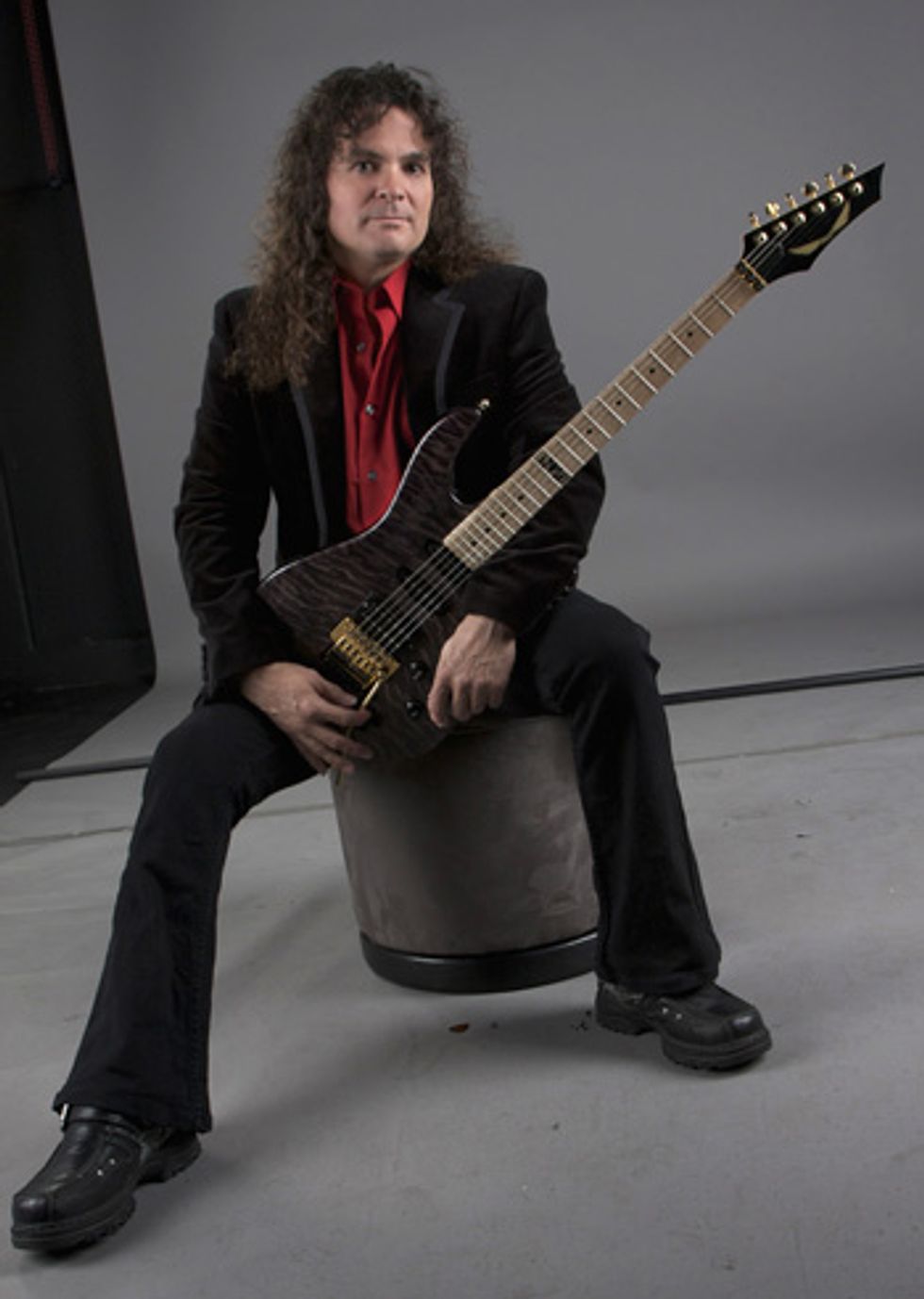 I agree. Some of it reminds me of a solo you once played on a backing track for a lesson in Guitar Techniques magazine. It was the rocking side to your guitar personality and a lot different than the neo-classical style you’re known for.
I agree. Some of it reminds me of a solo you once played on a backing track for a lesson in Guitar Techniques magazine. It was the rocking side to your guitar personality and a lot different than the neo-classical style you’re known for. I do hear about that occasionally. They wrote a backing track for me and I went in and just wailed over it. I remember the guy who was recording it saying, “Man, I think people are going to be surprised when they hear this. You’re playing be-bop and all this different stuff that I didn’t know you played.”
That’s what I hear on the new record. You’ve got rock, funk, blues licks and be-bop lines all over the record. All theses styles have been hiding and it’s great to finally hear them bust out. [Laughing]
I’ve always been a rock guy. That’s basically what I am, a rock artist. But I’m into lot’s of different styles of music, and I like to throw it all in and let it flow.
How did you track everything?
I did all my guitars at my home studio. Most of my stuff was done before the drums were down. I recorded it to loops or to drums that I programmed. The drummer had a totally finished track to play to. There were a few where he recorded to my demo and then I went back and re-did all the guitars. Most of the stuff was done backwards where the drummer played after me. In some cases I even left some of the loops in the song. On the song “Transcendence” there’s all this exotic percussion. That stuff was left in the track.
I’ve always had trouble tracking with the drummer coming in last.
You gotta have the right guy.
You got Van Romaine!
He’s amazing and did an awesome job. He locked in completely. A lot of guys can’t do that. Even if they’re great drummers, they can’t lock into a track that’s already finished. It’s hard. It always amazes me because the drummer is the timekeeper. A guitarist or bass player can overdub to drums easily because that’s what we’re used to doing, but drummers aren’t use to doing that. They’re used to being the timekeeper and having other people play to their groove. It can be tricky for a lot of guys but Van just killed it.
Are you happy with the new UFO record?
Yeah. I think it came out really great. This is the first time I've had two records coming out within a week of one another.
How has playing with UFO influenced your guitar playing on To The Core?
I’d say that all the live playing I’ve done has helped me become a better musician and player. You just get better when you play in front of people. You have to go with the flow no matter what they throw at you.
Before I forget, I flipped out when I heard your solos on Jordan Rudess’ Rhythm of Time record. I didn’t even know that was you until I checked the album notes!
Thanks. I played two solos on that for him. I remember I didn’t have a whole lot of time and my manager who manages Dream Theater asked me if I would do it. I was like, “I would love to do it but I don’t have a whole lot of time. I hope he doesn’t send me some complicated piece of music that’s like in 13/8 timing or something.” He was like, “Everybody’s saying that.” [Laughing] That guy is pretty damn serious.
I really dig hearing you in different musical contexts. I recommend you do more of that.
It’s cool because you get to play on a track that you never would have written for yourself, so you end up playing differently than you normally would.
It’s good for your fan base too. I’m sure there were a ton of Dream Theater fans thinking, “Who the hell is this guy?!” Next they’ll be tracking down your catalogue.
People find it funny that Jordan actually played on my second record. That was way back.
Some of your old fans would like to know if the Vicious Rumors demos will ever be released to the public.
I don’t know. I’m not in contact with those guys. I played on four or five tunes.
Supposedly there’s material out there that contains the holy grail of early Vinnie Moore.
I don’t have it. [Laughs] I don’t even know about this. We did one gig in somebody’s backyard, like an outdoor party. I think there’s a tape of that somewhere lingering around. The guy who probably knows is the bassist Dave Starr. That was a lot of fun and way long ago. [Laughing]
You’re playing a new guitar. What is it?
I’m using a signature model made for me called the Dean Vinman 2000. I’ve been working with those guys for about two years and we immediately started talking about a signature model. They put something together for me to play based on our phone conversations and they kinda nailed it. It was probably 95% of what I wanted on the first try. From that point we started honing in on things and making some cosmetic changes and moving different things around. We spent a year refining all these small little details and now the guitar I’m playing is right off the shelf. It’s just like what someone would buy in a music store. It’s great. I’m going out to do a clinic this Saturday and I’m not even going to bring a guitar. I’m just going to play one of my signature models off the rack. It’s awesome to be able to do that.
What are some of the particulars that you had Dean work on that are different from other models?
I think the big thing is the shape of the neck. That’s really important to me. How comfortable the neck is for the left hand. Also the cutaway on the body where your arm rests, that’s another thing that I’m really picky about. One of the things is how high the strings are off the body. I don’t like guitars where the strings are really high off the body like a Les Paul. It feels awkward to my right hand. The Floyd Rose had to be recessed into the body and be a certain height off the body to accommodate my crappy technique.
Yeah right. [Laughing] Is it a C neck or a U neck?
Maybe somewhere in between. It’s kind of hard to describe. It’s not real round as in a C neck. I don’t like big and chunky, but not so thin. I think if it’s too thin you lose tone... it’s gotta have some meat to it. The body is alder and it has a piece of laminate maple top for cosmetic reasons, just to give it that cool wood grain look. It’s only an 8th inch thick so it’s not enough to really affect the sound properties of the guitar. It comes in trans finishes so you can see the wood grain. It’s really cool-looking.
You’re also endorsing a pickup.
Dean started their own pickup line called DMT. I helped them design a bridge pickup and I’ve been using that. They made me a signature pickup (The Dean Vinnie Moore Shredhead Pickup). I’m still using DiMarzios in the middle and the neck positions but the bridge pickup is the signature model.
What’s special about it?
It has less power than the ones I was using in the past. This one is about 12 or 13k. It’s not quite as weak as an old PAF, but it’s about halfway back to a PAF compared to what I was using. It’s not low power or high power, it's mid power. It’s more transparent than some of the more high power stuff. You hear more of the pick attack and the dynamics and it sounds more natural to me. You get more tone, whereas when you have high power pickups I found that it’s not as transparent.
In the neck I’m using a DiMarzio Fast Track 1 and in the middle it’s a DiMarzio Virtual Vintage Blues. I have another guitar where I switch those two pickups just to get some different tones.
The new record has some great tones. You’ve gotten away from a lot of the higher gain sounds and gone for more organic tones.
Too much gain takes away from the natural dynamics and the personality of the guitar. It makes things muddy too. Even live I’ve never really used a lot of gain compared to most people. When it gets too gainy and too fuzzy it masks all the clarity of the guitar. You lose a lot of the natural resonance. I always find that I back off on the gain on the amp. A lot of times live and in the studio, I’m constantly moving the guitar volume up and down. Sometimes I’ll move it up to ten, sometimes I’ll kick it back to seven or eight. Sometimes it’s on four. I get a lot of tones just by manipulating the guitar volume control. Turn it back to four and you get a nice, clean, half-crunchy kind of sound.
Are your amps set up to get a lead tone and then you back it off with the guitar volume?
Yeah. I set the amp for one tone on the amp all night and just leave it there. That’s what works for me. It’ll have enough gain to where if I’m playing lead and the guitar volume is on ten I get sustain but no muddiness. Then I’ll just back off when I want to clean things up. No channel switching, just one sound.
What amp are you using?
I’ve been using an Engl Special Edition head which is amazing because it has four thousand bells and whistles, none of which I use. [Laughing] I set it up for one tone and that’s it. In the studio I use a Marshall JCM2000. I have a lot of heads lying around that I use, but for some reason that Marshall JCM2000 seems to work when you throw a mic in front of it. I use the Lead 1 setting which is less gain and I’ll keep the preamp anywhere from five to eight.
What kinds of effects?
My pedalboard is always changing. I don’t even know what it’s going to be for the June tour. Normally I’m pretty simplistic with my effects. There’s a wah-wah and a delay just to give me some ambiance and that’s pretty much the heart of my sound. I’m using a Dunlop Crybaby. At one point I felt like I was getting too dependent on the wah. I was just stepping on it more out of habit because it was there, so I almost left it home. Then I made a conscious effort to have it there but not use it unless I absolutely needed it. You can easily get lost in it and overdo the wah thing.
Yeah, but you’re covering Schenker.
Yeah that’s the thing. He always had the half-cocked wah-wah pedal sound, and so sometimes I’ll kick it on for that.
Were you pressured at all to get close to his note selection and style for those songs?
Not really. When we first started rehearsing, Phil was real adamant about me doing my own thing. I was going to copy some of the Schenker stuff and he said, “No, do your own thing!” That was really cool for me to hear that they wanted a guy who had his own personality and wasn’t just a copycat. My approach is that there are certain things in the old songs where you have to play the part on the record because it’s an important part of the song. On the sections where he improvises, I just kind of go off and improvise.
I like that you’re respectful to those classic tunes, yet you bring your own thing to the table.
I’m always trying to do what’s right for the song. I don’t try to shred classical arpeggios over a rock 'n' roll song. [Laughing] It’s not tasteful and it doesn’t work. I go for the vibe of the song and let that be the guiding light.
Which delays are you using?
I’ve always liked the Boss DD-3. They’re inexpensive, they have a great sound and they just work. I started using some T-Rex pedals and the MXR Carbon Copy which has that warm analog sound. I would guess that I’ll take those three delays out on the
| VINNIE'S GEARBOX Guitar: Dean Vinman 2000 Amps: ENGL Special Edition Marshall JCM2000 Effects: MXR Carbon Copy Delay T-Rex Replica Delay Dunlop Crybaby Wah |
Guitarists like to compare you to Tony MacAlpine, especially in the early days. If you were to go into The Octagon with Tony MacAlpine, who would win?
[Laughing] Good question. I think we would end up playing together and having a lot of fun. Tony is a great guy and a really talented artist.
www.vinniemoore.com







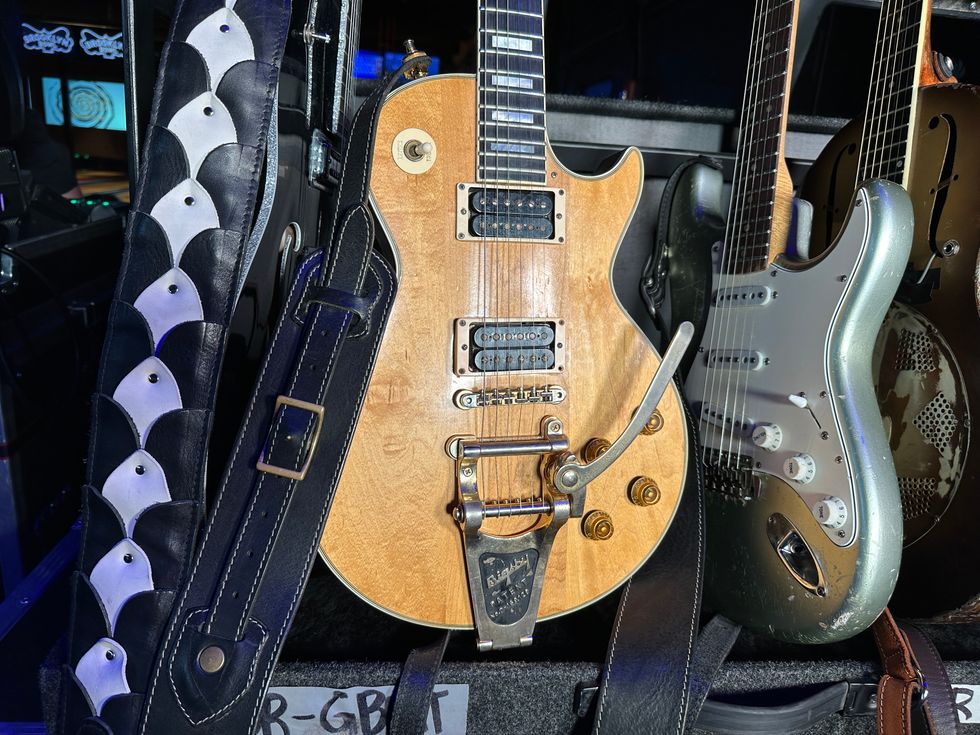
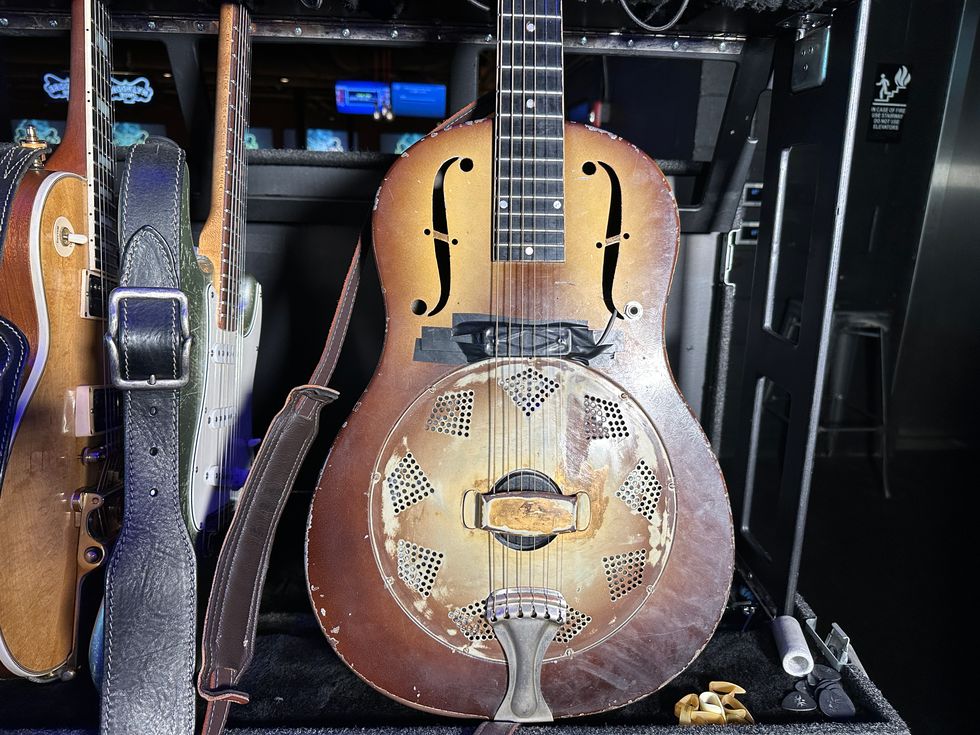
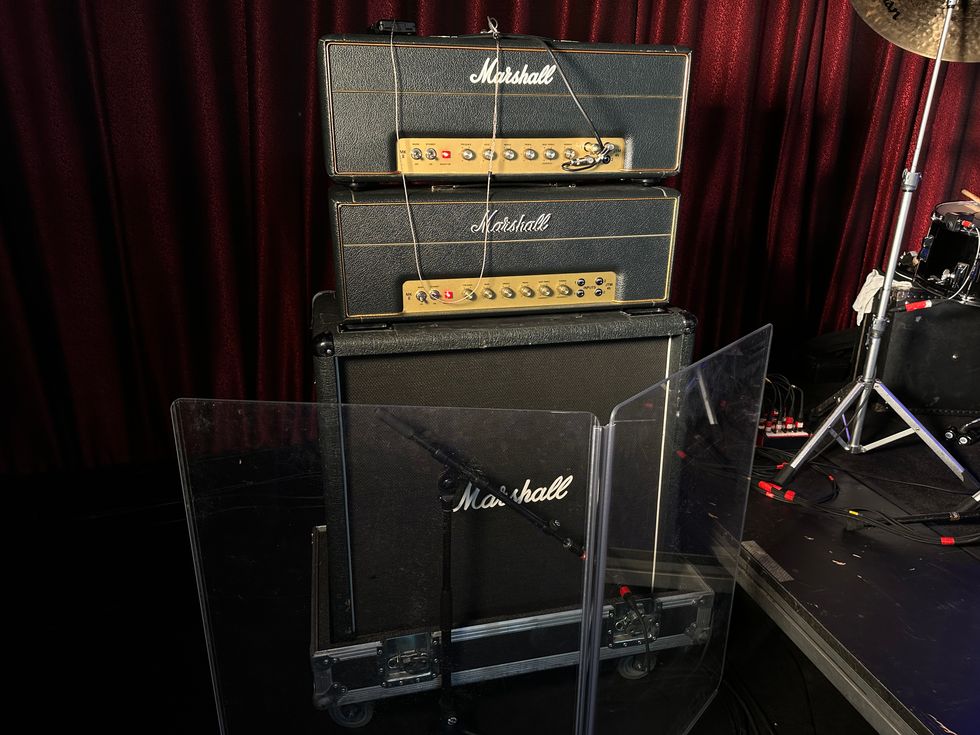
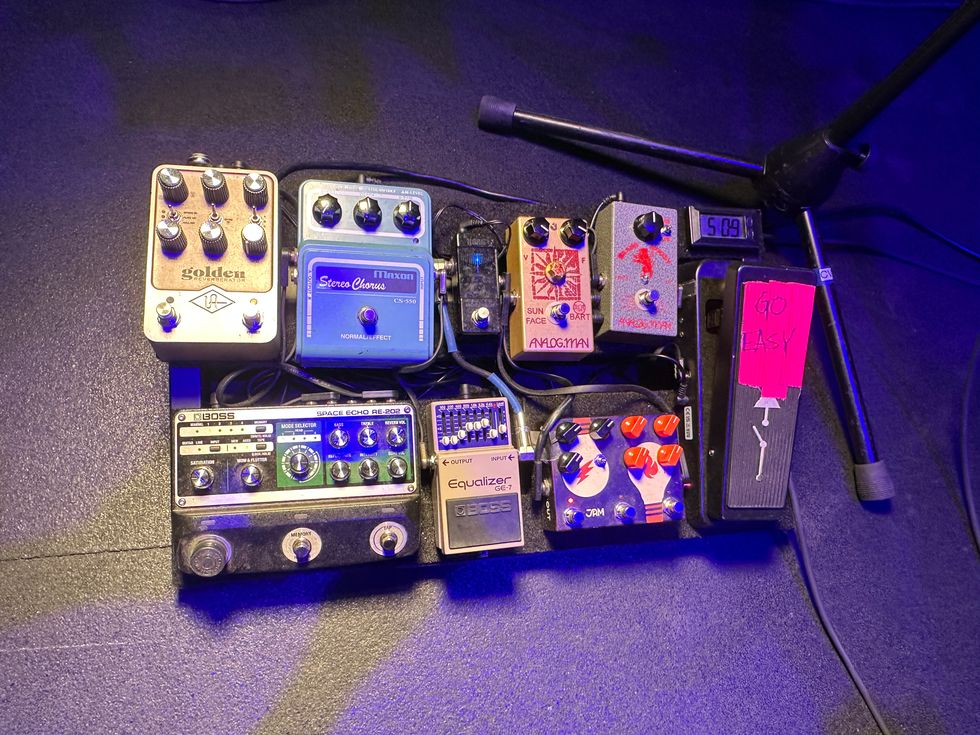
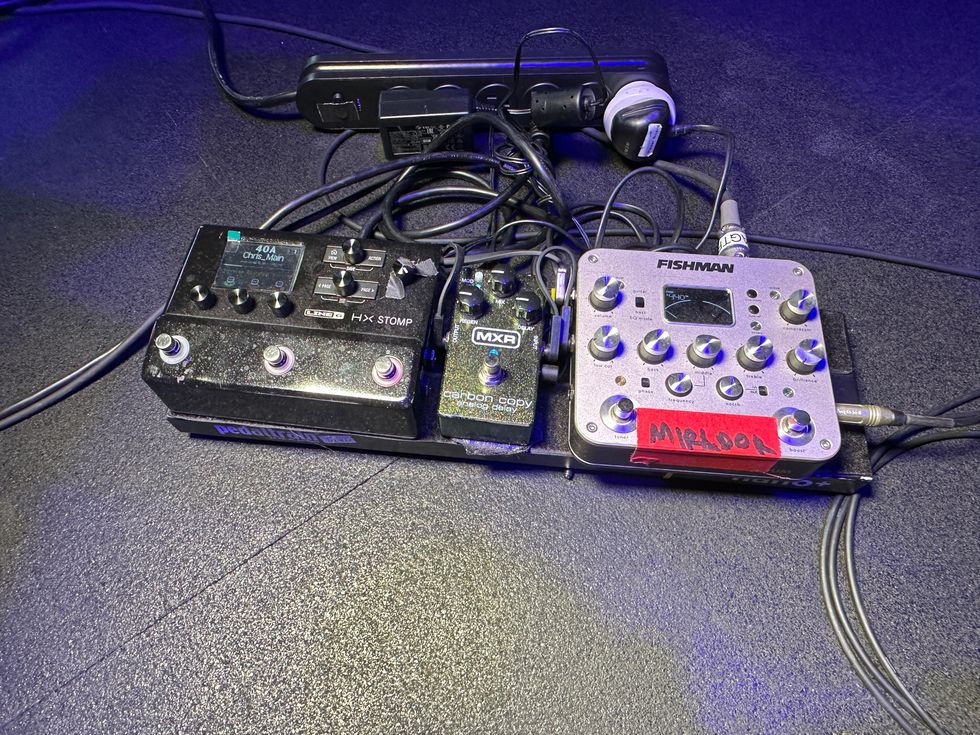
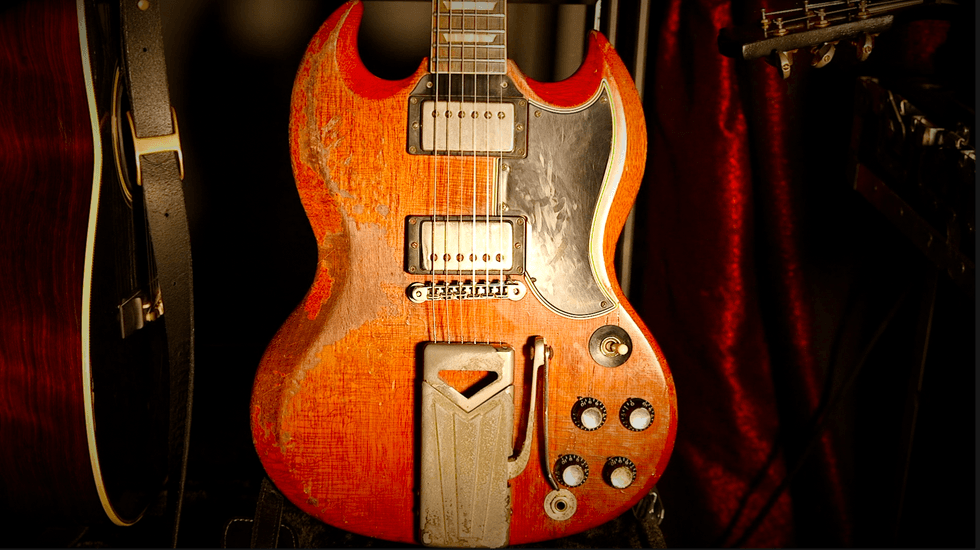
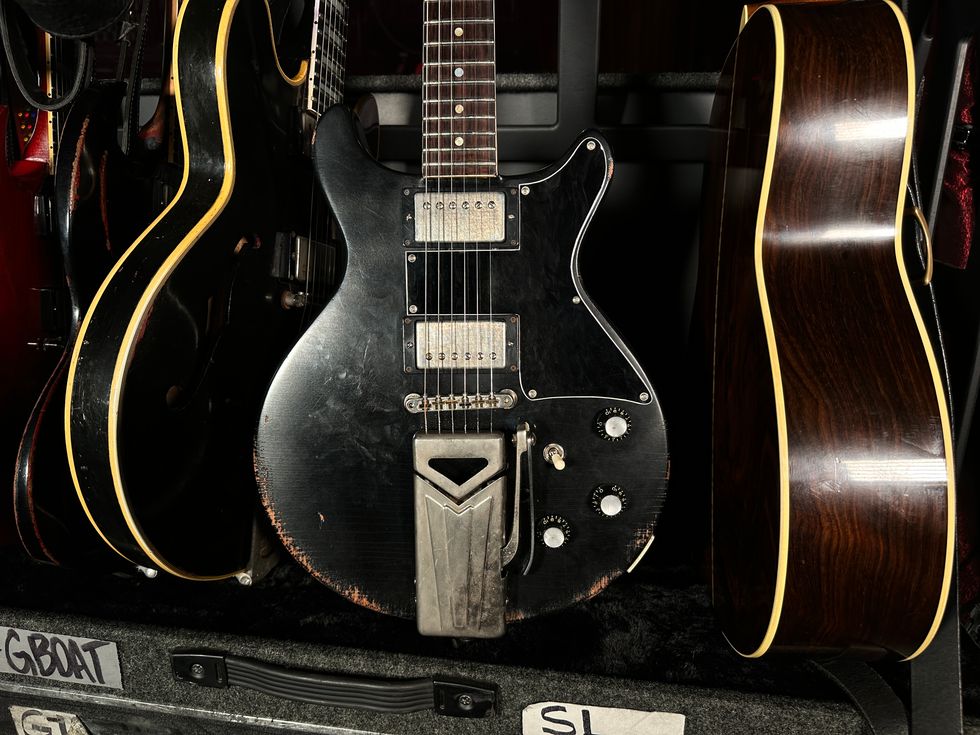
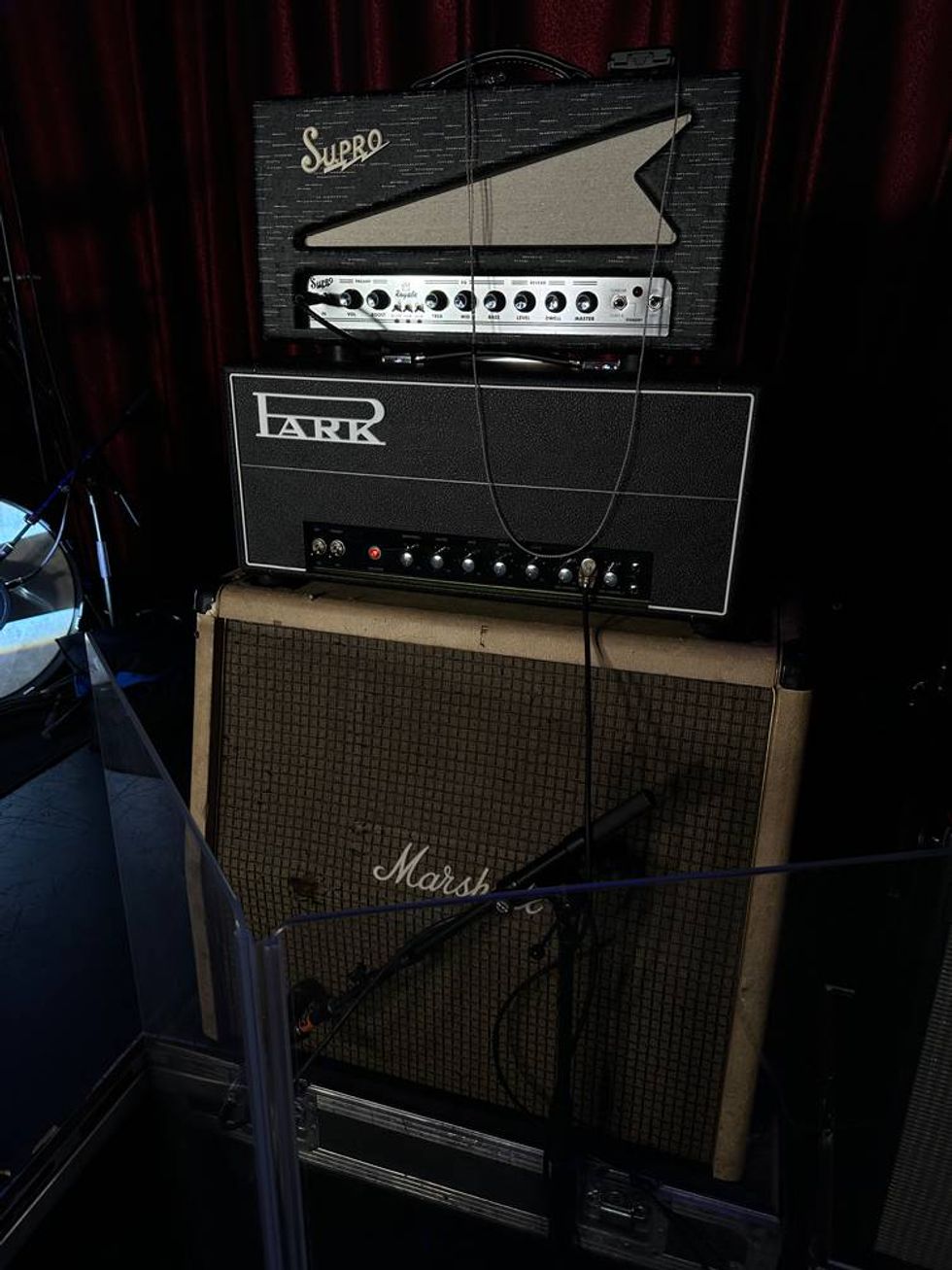
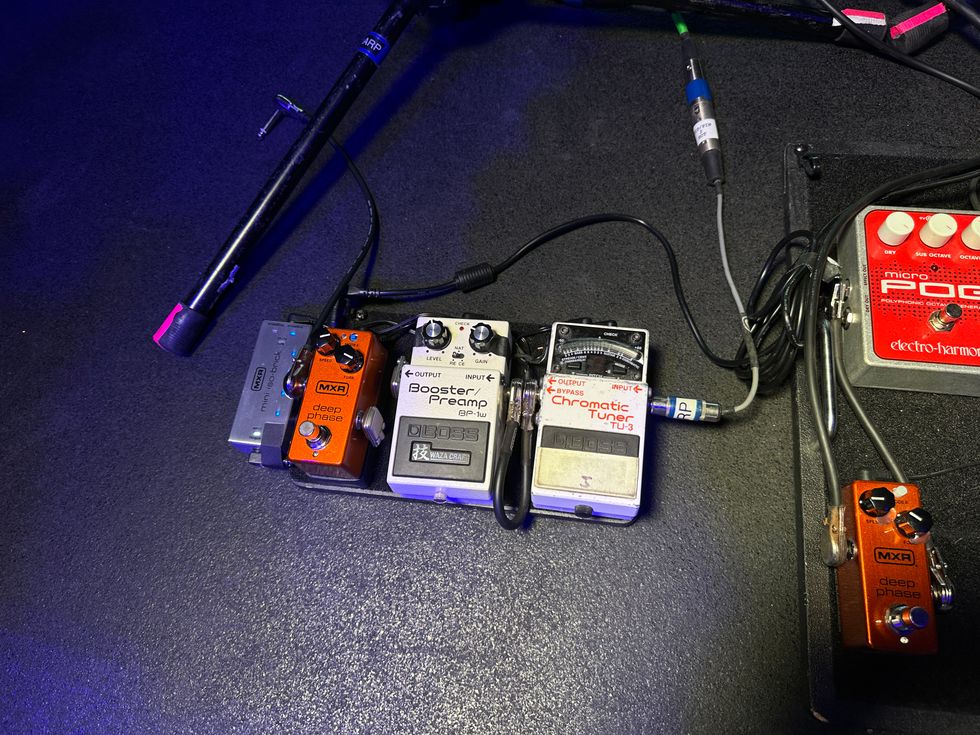
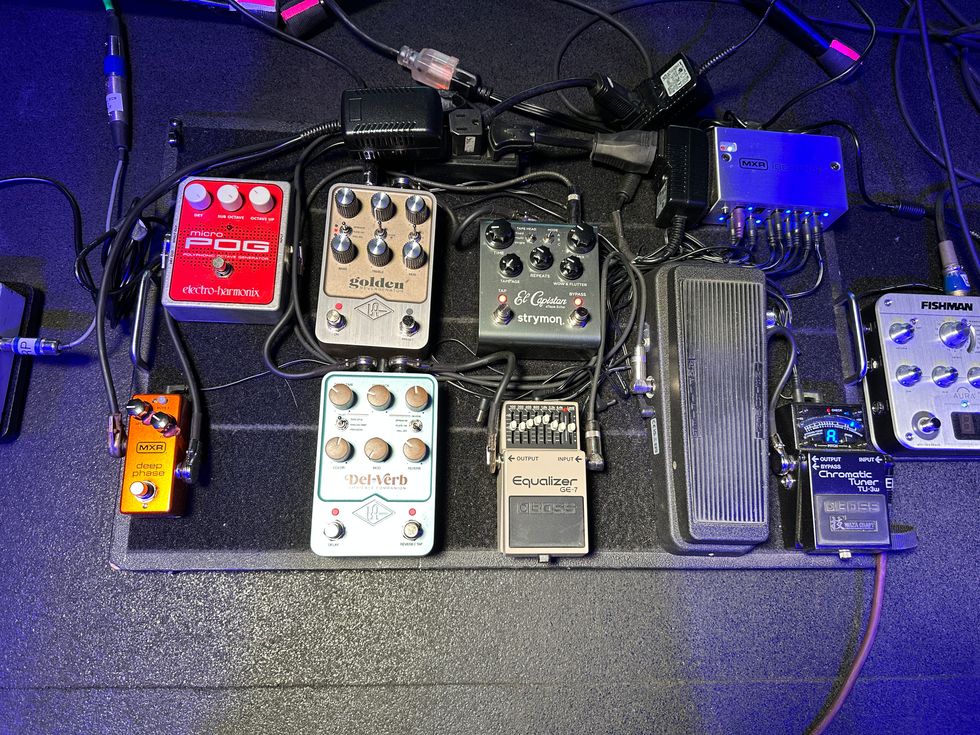
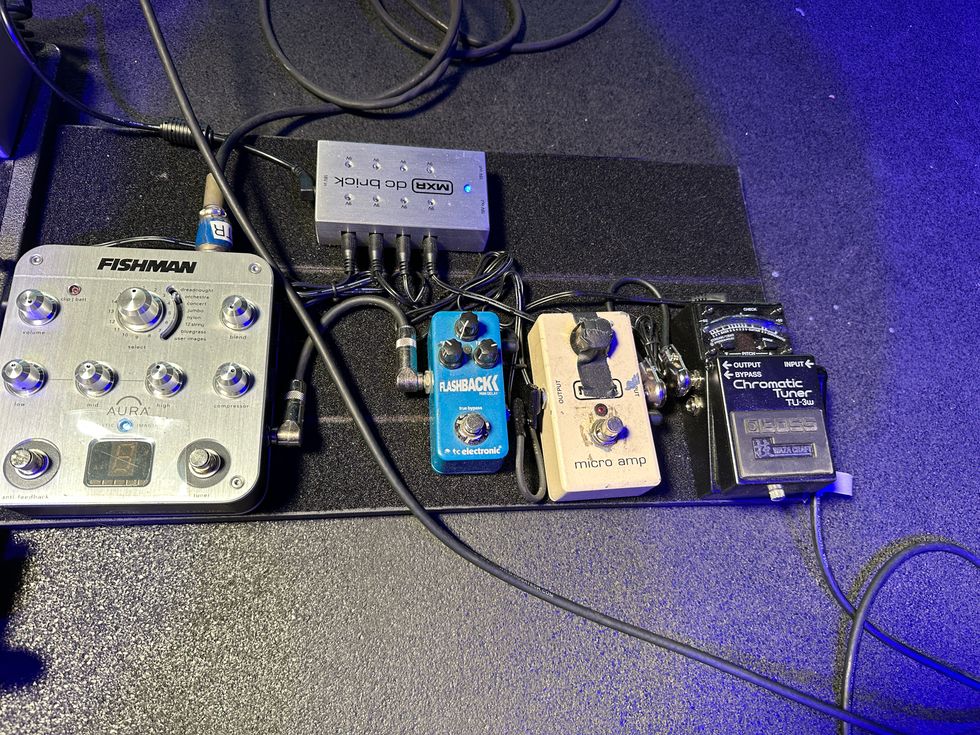

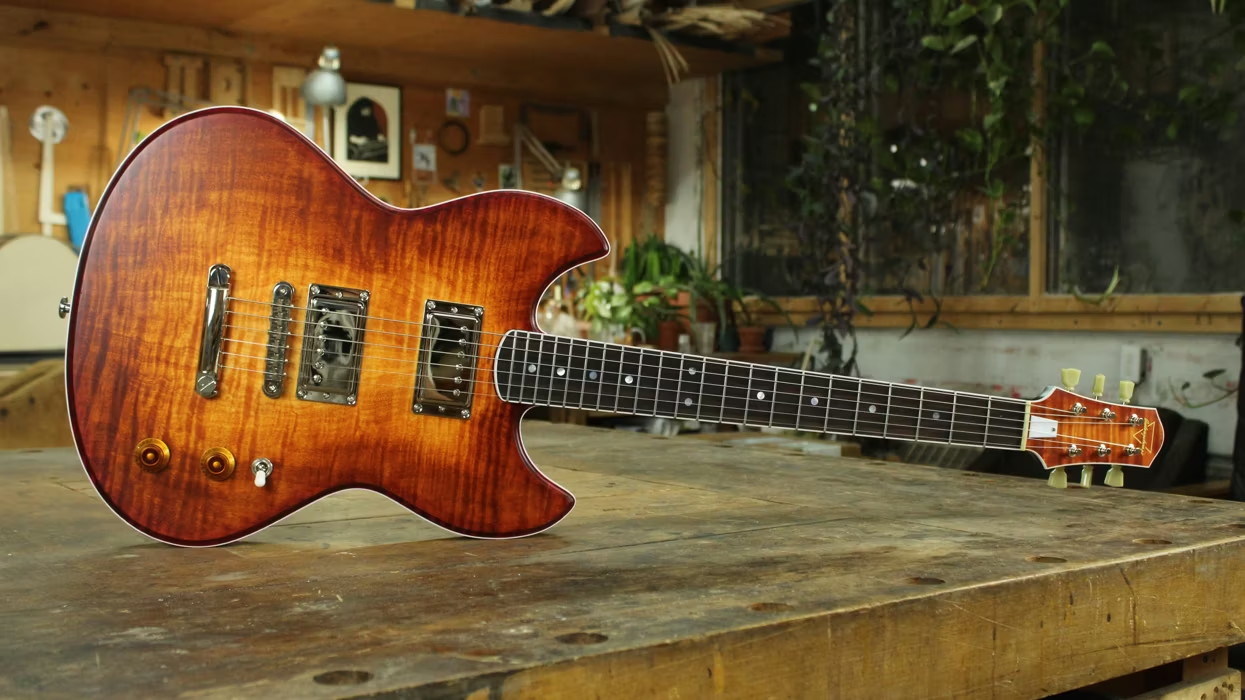
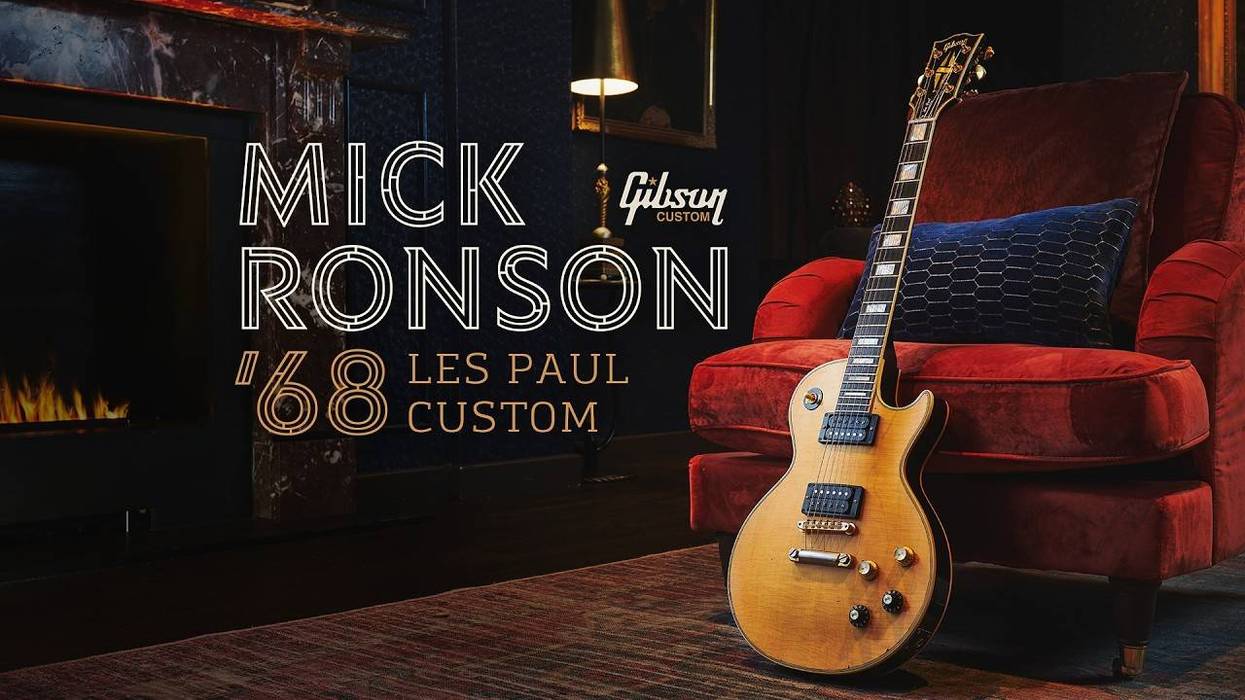
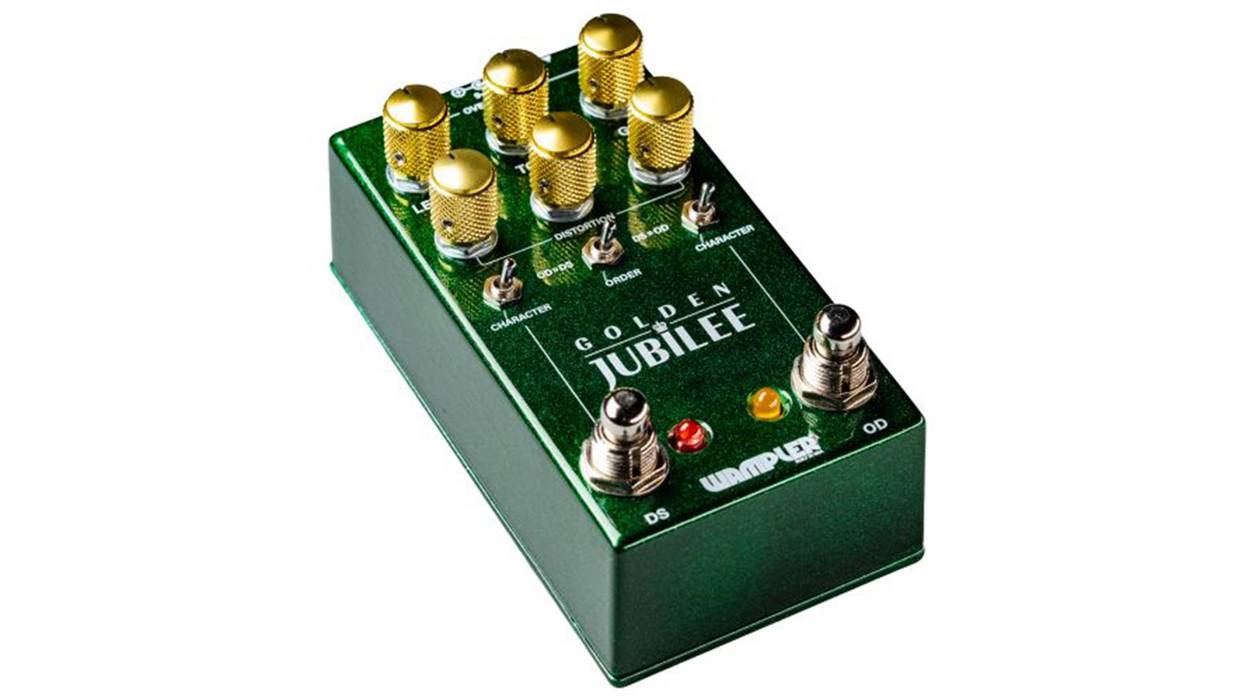
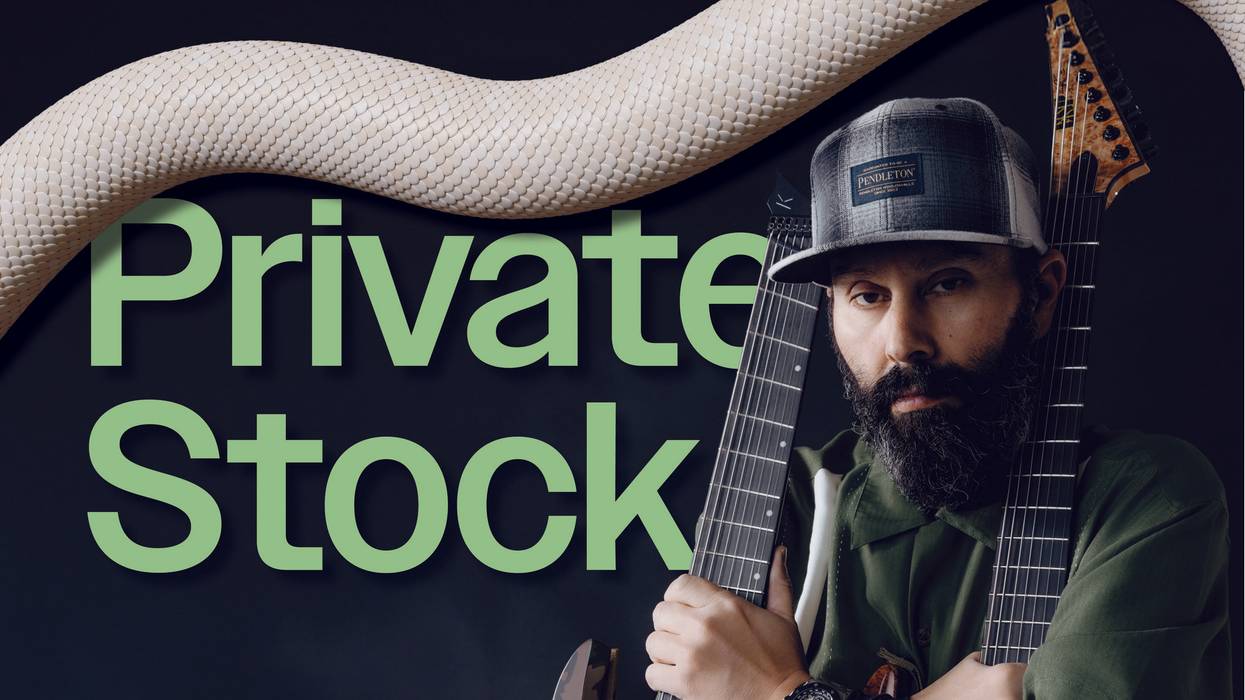
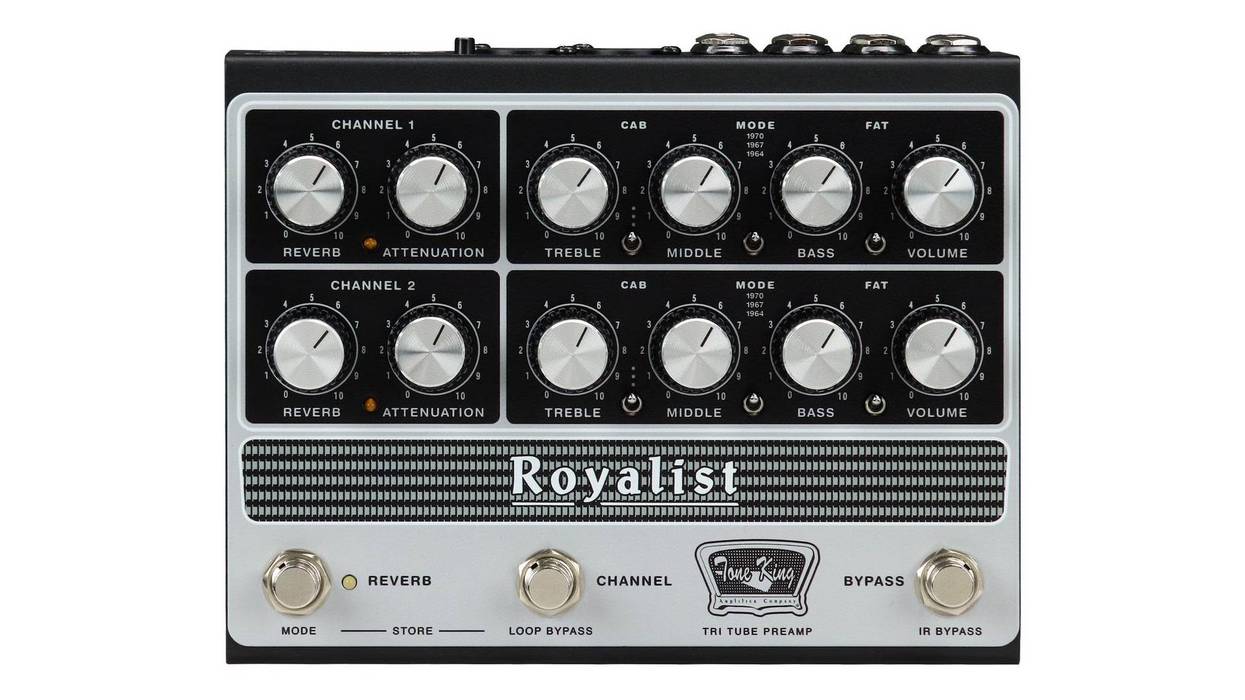
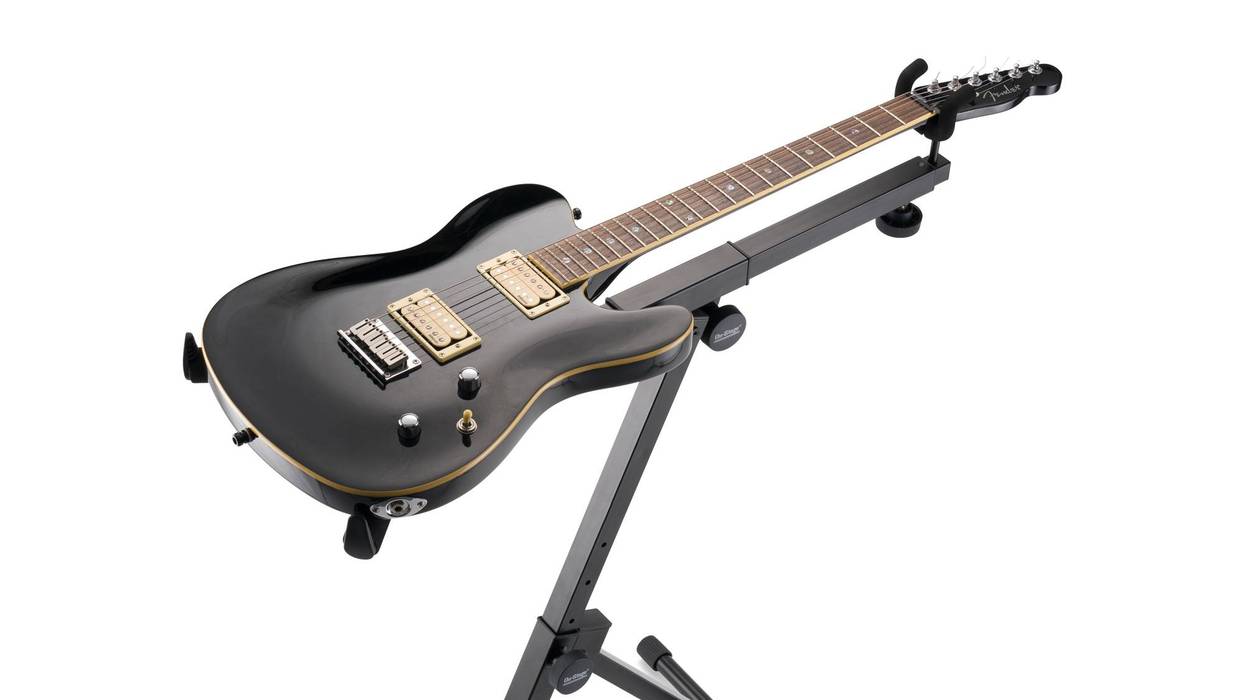




![Rig Rundown: Russian Circles’ Mike Sullivan [2025]](https://www.premierguitar.com/media-library/youtube.jpg?id=62303631&width=1245&height=700&quality=70&coordinates=0%2C0%2C0%2C0)















